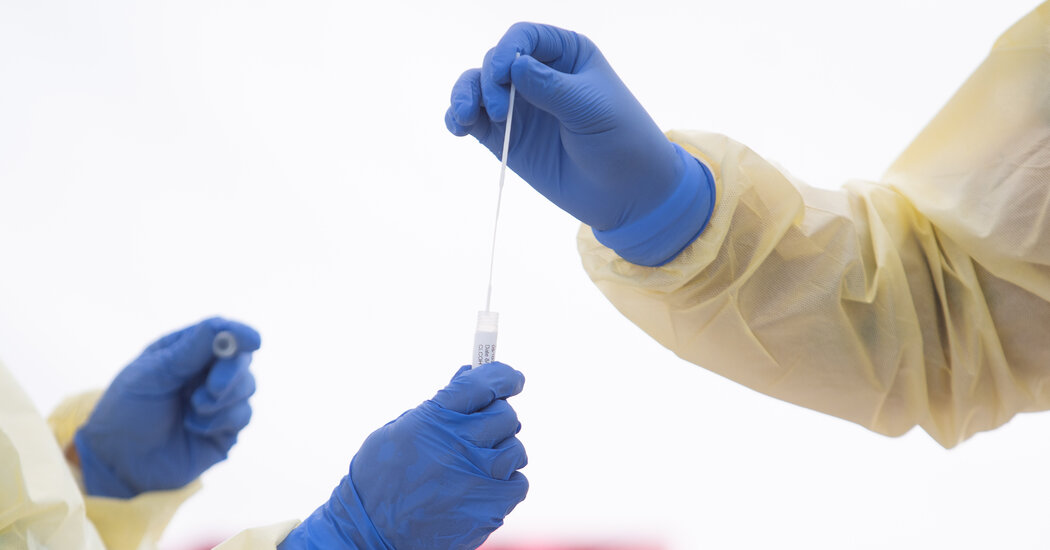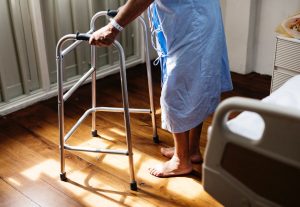The world of coronavirus testing is complicated and confusing. There are lab tests and home tests, spit tests, swab tests and blood tests. But there are still, somehow, not enough tests. On Monday, the Centers for Disease Control and Prevention revised guidelines for who should get tested. But those revisions did little to resolve the thorny questions many people are grappling with.
Whether you need a test, or can even get one, still depends on where you live, where you work and which testing facility you visit. Unfortunately, without a national testing strategy focused on substantially scaling up the nation’s testing capacity, none of this is likely to change anytime soon.
In an editorial earlier this month, we asked readers to submit their questions about coronavirus testing. A selection follows, edited for clarity and length, with some answers to keep in mind as you continue to navigate the morass.
The different types of coronavirus tests
What, exactly, is a test? People get swabbed, then what? Does the swab go to a lab, evaluated then and there? What distinguishes a rapid test from a regular one? — John Langmaid, Glastonbury, Conn.
Broadly speaking, there are three different kinds of tests for the novel coronavirus.
Molecular tests (mostly what are called PCR tests) diagnose active infection by detecting the virus’s genetic material, usually in swabs taken from the nose or throat. Because these tests require laboratory analysis, it can take at least one to two days to get results back — and often much longer, because of supply chain bottlenecks and backlogs at many of the nation’s labs. Still, the vast majority of tests being done in the United States right now fall into this category.
Antigen tests are also meant to detect active infection — and are also usually done via nose or throat swab — but they are better for screening populations than diagnosing individuals, because they tend to be faster, cheaper and less accurate than molecular tests. Most antigen tests can be done in minutes to hours because they don’t have to be analyzed at a laboratory — this is what doctors refer to as “rapid” or “point-of-care” testing. So far, the Food and Drug Administration has granted four antigen tests emergency-use authorization. These tests are still difficult to come by — not all clinics have them — but they are increasingly being used in nursing homes and other nonclinical settings.
Antibody tests cannot tell whether you are actively infected with coronavirus — only if you have been infected at some point in the past. These tests are meant to detect specific antibodies (special proteins your immune system produces to fight the virus) in your blood. There are more than 100 of them on the market right now, and they are available in many if not most clinical settings. As with antigen tests, most experts think antibody tests are only really useful for screening populations — not individuals.
What about accuracy?
How accurate is each type of test? — Maria Morancy Talbott, Portland, Ore.
In my own extended family, we saw 10 family members suffer Covid symptoms after my grandmother’s funeral. Only five tested positive. I had two tests (as suggested in the opinion piece) — and both were negative with 11 days of symptoms all in line with Covid. What use are tests if they are false negative? — Michelle Kelly, Plainfield, Ill.
Lab-based molecular tests are the most accurate way to determine whether you have an active coronavirus infection. But they can still be tricky. A positive result almost certainly means you are infected. A negative result almost certainly means that you don’t have an active infection — but you could still have the virus, if it has not yet replicated enough to be detected. Several companies now offer at-home molecular tests, where you mail your own sample in for analysis. Most of them boast a high accuracy rate, but keep in mind that they are being sold through emergency authorization and so have not been fully vetted by the F.D.A.
Antigen tests tend to be good at confirming that you are infected and only so-so at confirming that you are not. Antibody tests are notoriously unreliable. Even the best ones are known to produce many false positives and false negatives. And even if you get an accurate antibody test, that won’t tell you for sure if you’re immune to the coronavirus. However, both test types can still be useful for gauging where and how far the virus is spreading in a given community. At the population level, repeated testing can compensate for false results and can give a good estimate of how many people are or have been infected.
I have no symptoms. Should I get tested?
I am 71 years old, live alone and am trying to stay in as much as possible, but I live in an area where cases are rising dramatically. I am confused about getting tested. I don’t want to take up a valuable test more needed by someone else. I am thankfully so far asymptomatic. — Lin Kaatz Chary, Gary, Ind.
Which tests should we take if we have no symptoms? My wife and I may have been exposed to Covid early in January. My wife had a bad dry cough and lost her sense of taste for a long time. — Steven Davidson, Georgetown, Tex.
Only an antibody test can detect a past infection, but those tests are fairly useless more than a few weeks after the infection passes (something that’s impossible to time if you never had symptoms to begin with). With few exceptions, the Infectious Disease Society of America does not recommend antibody tests for individuals, owing to low accuracy rates.
When or whether to get a diagnostic test is still a tricky question. On one hand, even if you have no symptoms, you may still be infected and contagious. On the other, testing backlogs mean that one person’s “just for peace of mind” test may delay another person’s “urgently need to know” test. You may want to skip the clinic-based molecular test if you have no clear reason to be worried about exposure (meaning you were not in a crowded room, and none of your close contacts have recently tested positive); if you don’t live with someone who is elderly or immune compromised; or if you have concerns but can easily quarantine yourself until the threat of contagion passes (meaning you don’t need to leave home for work).
As they become more available, antigen tests and any other rapid, point-of-care tests that are easy to use in nonclinical settings will become a better option for regularly screening lots of people. But again, those tests need to be taken regularly to compensate for false results.
Timing your test
If you’ve been exposed, but have no active infection yet (thus would test negative), can you infect others? How soon after exposure are you contagious to others? Immediately or only after you could test positive (regardless of display of symptoms)? — Robin Lacey, Winchester, Mass.
In general, if you are shedding enough virus to make you contagious, a molecular test will detect it. So far, the evidence suggests that people can become contagious anywhere from two days to two weeks after they are first infected — even if they have no symptoms — and can remain so for as long as two weeks. Because this window — during which a molecular test can accurately detect the virus — varies and can be very short, most doctors say you should have two of these tests, a week or so apart.
If you’re planning to have an antigen test to determine whether you are infected or contagious before a particular event, you should be tested a few times over the space of a week or so, to compensate for the possibility that any one result could be inaccurate. Getting one test right before a cocktail party will not suffice.
If you decide to get an antibody test to try and determine if you were infected in the past, you should take it between two and eight weeks after your symptoms go away. Again, antibody test results are unreliable, and having antibodies does not necessarily mean that you are immune — but that time period will give you the best chance of getting a useful result.
New tests in the works
What are the chances of developing a home testing kit, showing results in a few hours, akin to a home pregnancy test? — Don Brophy, New York City
The chances are good, but it will take a bit more time. Scores of tests — both molecular and antigen-based — are currently being developed. The most promising ones can give results in as little as five to 15 minutes, at home or in a doctor’s office — no lab needed. In theory, at least, some of these tests could be produced easily enough to make widespread use possible. But it will most likely take a few more months before the F.D.A. authorizes or outright approves many of them. (That’s not necessarily a bad thing — we want to know that they work reasonably well before we start relying on them.)
The agency made some progress this month when it granted emergency use authorization to two new antigen tests and to one of the fastest and potentially cheapest molecular tests yet. The new rapid test, which detects viral genetic material in your saliva, is already in use by the N.B.A. (which funded its development) and could be widely available as early as this fall.
The Times is committed to publishing a diversity of letters to the editor. We’d like to hear what you think about this or any of our articles. Here are some tips. And here’s our email: [email protected].
Follow The New York Times Opinion section on Facebook, Twitter (@NYTopinion) and Instagram.



















